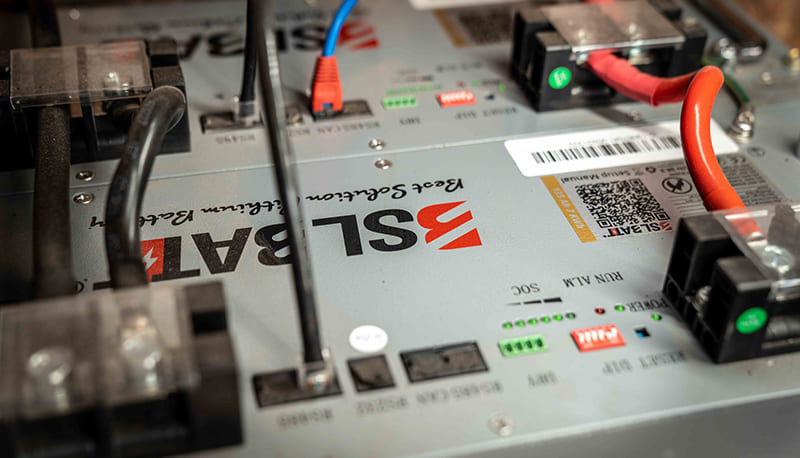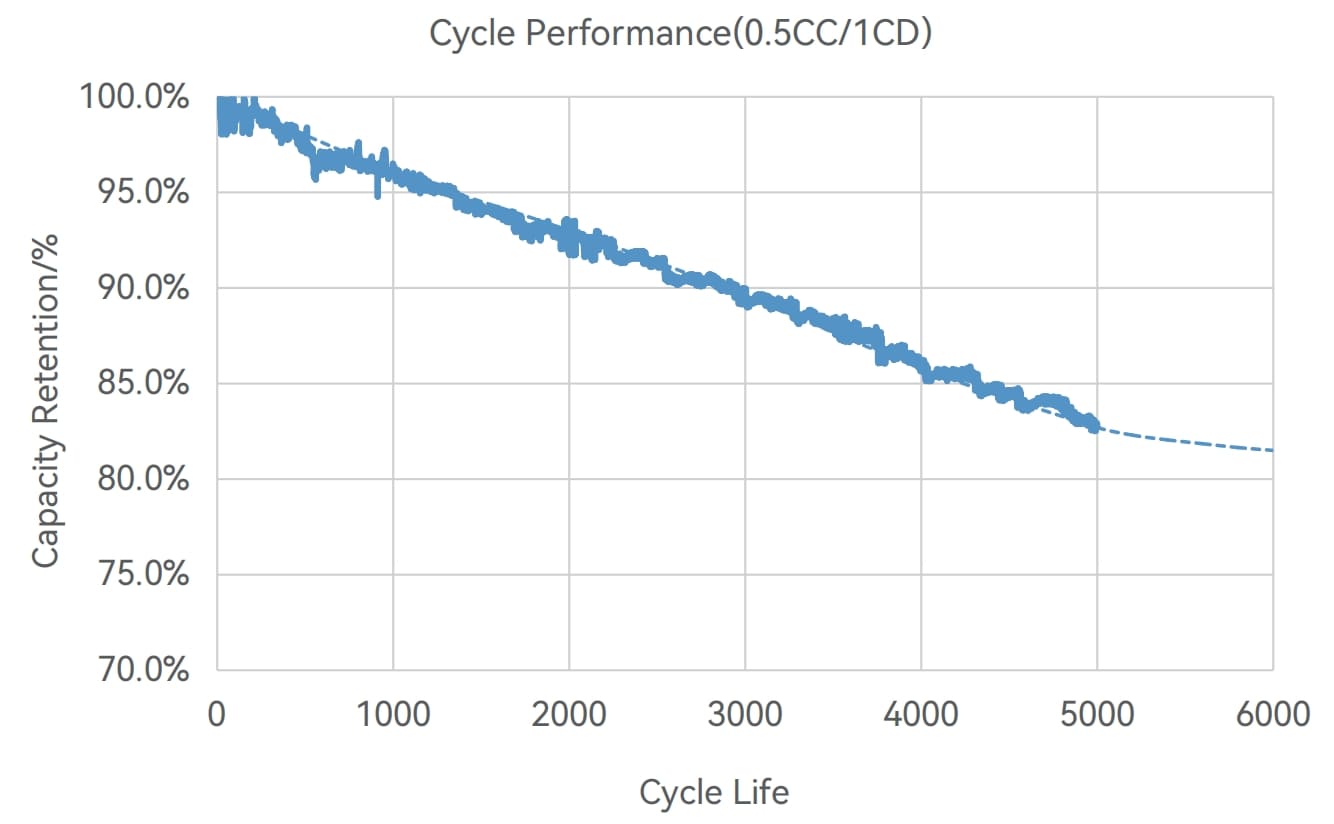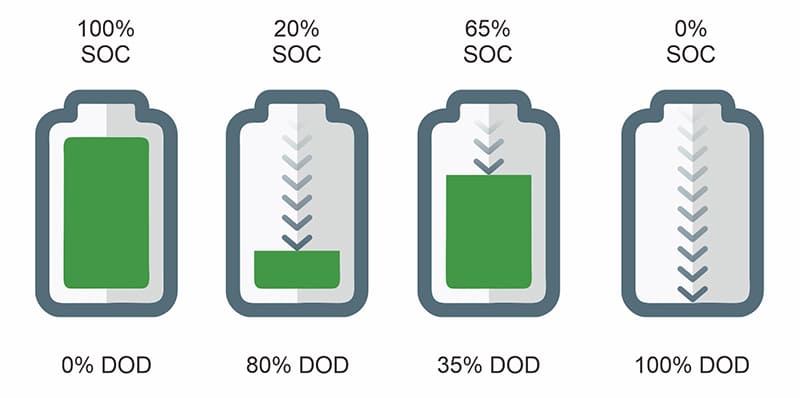Solar batteries are an important component of solar energy systems, as they store the energy produced by the solar panels and allow it to be used when needed. There are a number of different types of solar batteries available, including lead-acid, nickel-cadmium, and lithium-ion batteries. Each type of battery has its own unique characteristics and lifespan, and it is important to consider these factors when choosing a solar battery for your home or business.
Lithium-ion Solar Battery Lifespan Vs. Others
Typically used in solar systems, lead-acid batteries are the most common type of solar batetry and are known for their low cost, typically lasting 5 to 10 years. However, compared to other types of batteries, they are prone to losing capacity over time and may need to be replaced after a few years of use.Nickel-cadmium batteries are less common and have a shorter lifespan compared to lead-acid batteries, which usually last about 10-15 years.
Lithium-ion solar batteries are becoming increasingly popular in solar systems; they are expensive but have the highest energy density and their lifespan is longer than that of lead-acid batteries. These batteries last about 15 to 20 years, depending on the manufacturer and the quality of the battery.Regardless of the type of battery, it is important to follow the manufacturer’s recommendations for maintaining and caring for the battery to ensure that it performs at its best and lasts as long as possible.
How long does the BSLBATT LiFePO4 Solar Battery last?
The BSLBATT LiFePO4 Solar Battery is made from the world’s top 5 Li-ion battery brands such as EVE, REPT, etc. After our cycle test, these batteries can have a cycle life of more than 6,000 cycles at 80% DOD and 25℃ indoor temperature. Normal use is calculated based on one cycle per day, 6000 cycles / 365 days > 16 years, that is to say, BSLBATT LiFePO4 Solar Battery will last for more than 16 years, and the EOL of the battery will still be >60% after 6000 cycles.
What affects lithium-ion solar battery Lifespan?
These batteries are known for their high energy density, long lifespan, and low self-discharge rate, making them an attractive choice for storing and using solar energy. However, there are a number of factors that can affect the lifespan of a solar lithium battery, and it is important to understand these factors in order to get the most value out of your investment.
One factor that can impact the lifespan of a solar lithium battery is temperature.
Lithium batteries tend to perform poorly in extreme temperatures, particularly in cold environments. This is because the chemical reactions that take place within the battery are slowed down at low temperatures, resulting in reduced capacity and shorter lifespan. On the other hand, high temperatures can also be detrimental to battery performance, as they can cause the electrolyte to evaporate and the electrodes to break down. It is important to store and use lithium batteries in a temperature-controlled environment to ensure optimal performance and extend their lifespan.
Another factor that can affect the lifespan of a solar lithium battery is the depth of discharge (DoD).
The DoD refers to the amount of a battery’s capacity that is used up before it is recharged. Solar lithium batteries can typically withstand deeper depths of discharge than other types of batteries, but regularly discharging them to their full capacity can shorten their lifespan. To extend the lifespan of a solar lithium battery, it is recommended to limit the DOD to around 50-80%.
PS: What is A Deep Cycle Lithium Battery?
Deep cycle batteries are designed for repeated deep discharges, i.e., the ability to discharge and recharge the battery capacity (usually more than 80%) multiple times, with two important performance indicators: one is the depth of discharge, and the other is the number of repeated charges and discharges.
The deep cycle lithium battery is a kind of deep cycle battery, using lithium technology (such as lithium iron phosphate LiFePO4) to build, so as to have many significant advantages in performance and service life, lithium batteries can usually reach 90% of the depth of discharge, and in the premise of maintaining the battery can have a longer service life, the manufacturer of lithium batteries in the solar energy production usually do not let it exceed 90%.
Characteristics of Deep Cycle Lithium Battery
- High energy density: Compared to traditional lead-acid batteries, lithium batteries offer higher energy density and store more power in the same volume.
- Lightweight: Lithium batteries are lightweight and easy to carry and install, especially in applications that require mobility or limited space.
- Fast charging: Lithium batteries charge faster, which reduces equipment downtime and improves efficiency.
- Long cycle life: The cycle life of deep cycle lithium batteries is usually several times that of lead-acid batteries, often up to thousands of full discharge and charge cycles.
- Low self-discharge rate: Lithium batteries have a lower self-discharge rate when they are idle for a long period of time, which makes them more capable of maintaining power.
- High safety: Lithium iron phosphate (LiFePO4) technology, in particular, offers higher thermal and chemical stability, reducing the risk of overheating or combustion.
The charge and discharge rate of a solar lithium battery can also impact its lifespan.
Charging and discharging the battery at a higher rate can increase the internal resistance and cause the electrodes to break down more quickly. It is important to use a compatible battery charger that charges the battery at the recommended rate in order to extend its lifespan.
Proper maintenance is also crucial for maintaining the lifespan of a solar lithium battery.
This includes keeping the battery clean, avoiding overcharging or discharging, and using a compatible battery charger. It is also important to regularly check the battery’s voltage and current to ensure that it is functioning properly.
The quality of the lithium ion solar battery itself can also have a significant impact on its lifespan.
Cheap or poorly-made batteries are more prone to failure and have a shorter lifespan compared to high-quality batteries. It is important to invest in a high-quality solar lithium battery from a reputable manufacturer to ensure that it performs well and has a long lifespan.
In conclusion, the lifespan of a solar lithium battery is affected by a number of factors, including temperature, depth of discharge, charge and discharge rate, maintenance, and quality. By understanding these factors and taking appropriate precautions, you can help extend the lifespan of your solar lithium battery and get the most value out of your investment.
Post time: May-08-2024











